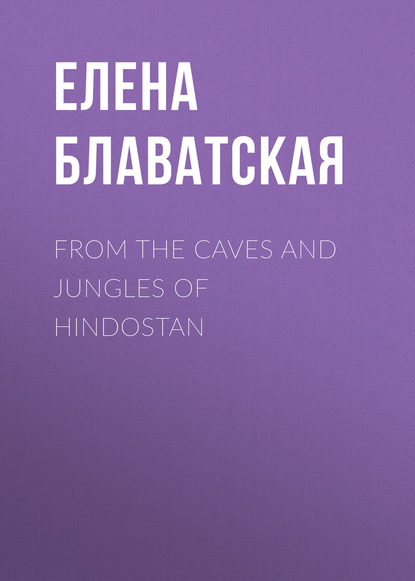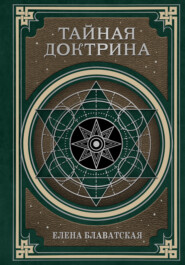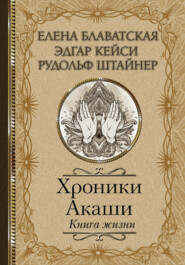По всем вопросам обращайтесь на: info@litportal.ru
(©) 2003-2024.
✖
From the Caves and Jungles of Hindostan
Настройки чтения
Размер шрифта
Высота строк
Поля
"Above everything I am a Hindu," answered the "mute general." "And the Hindus, as you know, consider it sinful before nature and before their own consciences to kill an animal put to flight by the strength of man, be it even poisonous. As to the spiders, in spite of their ugliness, they are perfectly harmless."
"I am sure all this is because you think you will transmigrate into a black spider!" she replied, her nostrils trembling with anger.
"I cannot say I do," retorted Mulji; "but if all the English ladies are as unkind as you I should rather be a spider than an Englishman."
This lively answer coming from the usually taciturn Mulji was so unexpected that we could not help laugh-ing. But to our great discomfiture Miss X– was seriously angry, and, under pretext of giddiness, said she would rejoin Mr. Y– below.
Her constant bad spirits were becoming trying for our cosmopolitan little party, and so we did not press her to stay.
As to us we climbed through the second opening, but this time under the leadership of Narayan. He disclosed to us that this place was not new to him; he had been here before, and confided to us that similar rooms, one on the top of the other, go up to the summit of the mountain. Then, he said, they take a sudden turn, and descend gradually to a whole underground palace, which is sometimes temporarily inhabited. Wishing to leave the world for a while and to spend a few days in isolation, the Raj-Yogis find perfect solitude in this underground abode. Our president looked askance at Narayan through his spectacles, but did not find anything to say. The Hindus also received this information in perfect silence.
The second cell was exactly like the first one; we easily discovered the hole in its ceiling, and reached the third cell. There we sat down for a while. I felt that breathing was becoming difficult to me, but I thought I was simply out of breath and tired, and so did not mention to my companions that anything was wrong. The passage to the fourth cell was almost stopped by earth mixed with little stones, and the gentlemen of the party were busy clearing it out for about twenty minutes. Then we reached the fourth cell.
Narayan was right, the cells were one straight over the other, and the floor of the one formed the ceiling of the other. The fourth cell was in ruins. Two broken pillars lying one on the other presented a very convenient stepping-stone to the fifth story. But the colonel stopped our zeal by saying that now was the time to smoke "the pipe of deliberation" after the fashion of red Indians.
"If Narayan is not mistaken," he said, "this going up and up may continue till tomorrow morning."
"I am not mistaken," said Narayan almost solemnly. But since my visit here I have heard that some of these passages were filled with earth, so that every communication is stopped; and, if I remember rightly, we cannot go further than the next story."
"In that case there is no use trying to go any further. If the ruins are so shaky as to stop the passages, it would be dangerous for us."
"I never said the passages were stopped by the hand of time.... They did it on purpose...."
"Who they? Do you mean glamour?…"
"Colonel!" said the Hindu with an effort. "Don't laugh at what I say. … I speak seriously."
"My dear fellow, I assure you my intention is neither to offend you nor to ridicule a serious matter. I simply do not realize whom you mean when you say they."
"I mean the brotherhood.... The Raj-Yogis. Some of them live quite close to here."
By the dim light of the half-extinguished torches we saw that Narayan's lips trembled and that his face grew pale as he spoke. The colonel coughed, rearranged his spectacles and remained silent for a while.
"My dear Narayan," at last said the colonel, "I do not want to believe that your intention is to make fun of our credulity. But I can't believe either, that you seriously mean to assure us that any living creature, be it an animal or an ascetic, could exist in a place where there is no air. I paid special attention to the fact, and so I am perfectly sure I am not mistaken: there is not a single bat in these cells, which shows that there is a lack of air. And just look at our torches! you see how dim they are growing. I am sure, that on climbing two or three more rooms like this, we should be suffocated!"
"And in spite of all these facts, I speak the truth," repeated Narayan. "The caves further on are inhabited by them. And I have seen them with my own eyes."
The colonel grew thoughtful, and stood glancing at the ceiling in a perplexed and undecided way. We all kept silent, breathing heavily.
"Let us go back!" suddenly shouted the Akali. "My nose is bleeding."
At this very moment I felt a strange and unexpected sensation, and I sank heavily on the ground. In a second I felt an indescribably delicious, heavenly sense of rest, in spite of a dull pain beating in my temples. I vaguely realized that I had really fainted, and that I should die if not taken out into the open air. I could not lift my finger; I could not utter a sound; and, in spite of it, there was no fear in my soul—nothing but an apathetic, but indescribably sweet feeling of rest, and a complete inactivity of all the senses except hearing. A moment came when even this sense forsook me, because I remember that I listened with imbecile intentness to the dead silence around me. Is this death? was my indistinct wondering thought. Then I felt as if mighty wings were fanning me. "Kind wings, caressing, kind wings!" were the recurring words in my brain, like the regular movements of a pendulum, and interiorily under an unreasoning impulse, I laughed at these words. Then I experienced a new sensation: I rather knew than felt that I was lifted from the floor, and fell down and down some unknown precipice, amongst the hollow rollings of a distant thunder-storm. Suddenly a loud voice resounded near me. And this time I think I did not hear, but felt it. There was something palpable in this voice, something that instantly stopped my helpless descent, and kept me from falling any further. This was a voice I knew well, but whose voice it was I could not in my weakness remember.
In what way I was dragged through all these narrow holes will remain an eternal mystery for me. I came to myself on the verandah below, fanned by fresh breezes, and as suddenly as I had fainted above in the impure air of the cell. When I recovered completely the first thing I saw was a powerful figure clad in white, with a raven black Rajput beard, anxiously leaning over me. As soon as I recognized the owner of this beard, I could not abstain from expressing my feelings by a joyful exclamation: "Where do you come from?" It was our friend Takur Gulab-Lal-Sing, who, having promised to join us in the North-West Provinces, now appeared to us in Bagh, as if falling from the sky or coming out of the ground.
But my unfortunate accident, and the pitiable state of the rest of the daring explorers, were enough to stop any further questions and expressions of astonishment. On one side of me the frightened Miss X–, using my nose as a cork for her sal-volatile bottle; on the other the "God's warrior" covered with blood as if returning from a battle with the Afghans; further on, poor Mulji with a dreadful headache. Narayan and the colonel, happily for our party, did not experience anything worse than a slight vertigo. As to the Babu, no carbonic acid gas could inconvenience his wonderful Bengali nature. He said he was safe and comfortable enough, but awfully hungry.
At last the outpour of entangled exclamations and unintelligible explanations stopped, and I collected my thoughts and tried to understand what had happened to me in the cave. Narayan was the first to notice that I had fainted, and hastened to drag me back to the passage. And this very moment they all heard the voice of Gulab-Sing coming from the upper cell: "Tum-hare iha aneka kya kam tha?" "What on earth brought you here?" Even before they recovered from their astonishment he ran quickly past them, and descending to the cell beneath called to them to "pass him down the bai" (sister). This "passing down" of such a solid object as my body, and the picture of the proceeding, vividly imagined, made me laugh heartily, and I felt sorry I had not been able to witness it. Handing him over their half-dead load, they hastened to join the Takur; but he contrived to do without their help, though how he did it they were at a loss to understand. By the time they succeeded in getting through one passage Gulab-Sing was already at the next one, in spite of the heavy burden he carried; and they never were in time to be of any assistance to him. The colonel, whose main feature is the tendency to go into the details of everything, could not conceive by what proceedings the Takur had managed to pass my almost lifeless body so rapidly through all these narrow holes.
"He could not have thrown her down the passage before going in himself, for every single bone of her body would have been broken," mused the colonel. "And it is still less possible to suppose that, descending first himself, he dragged her down afterwards. It is simply incomprehensible!"
These questions harassed him for a long time afterwards, until they became something like the puzzle: Which was created first, the egg or the bird?
As to the Takur, when closely questioned, he shrugged his shoulders, and answered that he really did not remember. He said that he simply did whatever he could to get me out into the open air; that all our traveling companions were there to watch his proceedings; he was under their eyes all the time, and that in circumstances when every second is precious people do not think, but act.
But all these questions arose only in the course of the day. As to the time directly after I was laid down on the verandah, there were other things to puzzle all our party; no one could understand how the Takur happened to be on the spot exactly when his help was most needed, nor where he came from—and everyone was anxious to know. On the verandah they found me lying on a carpet, with the Takur busy restoring me to my senses, and Miss X– with her eyes wide open at the Takur, whom she decidedly believed to be a materialized ghost.
However, the explanations our friend gave us seemed perfectly satisfactory, and at first did not strike us as unnatural. He was in Hardwar when Swami Dayanand sent us the letter which postponed our going to him. On arriving at Kandua by the Indore railway, he had visited Holkar; and, learning that we were so near, he decided to join us sooner than he had expected. He had come to Bagh yesterday evening, but knowing that we were to start for the caves early in the morning he went there before us, and simply was waiting for us in the caves.
"There is the whole mystery for you," said he.
"The whole mystery?" exclaimed the colonel. "Did you know, then, beforehand that we would discover the cells, or what?"
"No, I did not. I simply went there myself because it is a long time since I saw them last. Examining them took me longer than I expected, and so I was too late to meet you at the entrance."
"Probably the Takur-Sahib was enjoying the freshness of the air in the cells," suggested the mischievous Babu, showing all his white teeth in a broad grin.
Our president uttered an energetic exclamation. "Exactly! How on earth did I not think of that before?… You could not possibly have any breathing air in the cells above the one you found us in.... And, besides,… how did you reach the fifth cell, when the entrance of the fourth was nearly stopped and we had to dig it out?"
"There are other passages leading to them. I know all the turns and corridors of these caves, and everyone is free to choose his way," answered Gulab-Sing; and I thought I saw a look of intelligence pass between him and Narayan, who simply cowered under his fiery eyes. "However, let us go to the cave where breakfast is ready for us. Fresh air will do all of you good."
On our way we met with another cave, twenty or thirty steps south from the verandah, but the Takur did not let us go in, fearing new accidents for us. So we descended the stone steps I have already mentioned, and after descending about two hundred steps towards the foot of the mountain, made a short reascent again and entered the "dining-room," as the Babu denominated it. In my role of "interesting invalid," I was carried to it, sitting in my folding chair, which never left me in all my travels.
This temple is much the less gloomy of the two, in spite of considerable signs of decay. The frescoes of the ceiling are better preserved than in the first temple. The walls, the tumbled down pillars, the ceiling, and even the interior rooms, which were lighted by ventilators cut through the rock, were once covered by a varnished stucco, the secret of which is now known only to the Madrasis, and which gives the rock the appearance of pure marble.
We were met by the Takur's four servants, whom we remembered since our stay in Karli, and who bowed down in the dust to greet us. The carpets were spread, and the breakfast ready. Every trace of carbonic acid had left our brains, and we sat down to our meal in the best of spirits. Our conversation soon turned to the Hardwar Mela, which our unexpectedly-recovered friend had left exactly five days ago. All the information we got from Gulab-Lal-Sing was so interesting that I wrote it down at the first opportunity.
After a few weeks we visited Hardwar ourselves, and since I saw it, my memory has never grown tired of recalling the charming picture of its lovely situation. It is as near a primitive picture of earthly Paradise as anything that can be imagined.
Every twelfth year, which the Hindus call Kumbha, the planet Jupiter enters the constellation of Aquarius, and this event is considered very propitious for the beginning of the religious fair; for which this day is accordingly fixed by the astrologers of the pagodas. This gathering attracts the representatives of all sects, as I said before, from princes and maharajas down to the last fakir. The former come for the sake of religious discussions, the latter, simply to plunge into the waters of Ganges at its very source, which must be done at a certain propitious hour, fixed also by the position of the stars.
Ganges is a name invented in Europe. The natives always say Ganga, and consider this river to belong strictly to the feminine sex. Ganges is sacred in the eyes of the Hindus, because she is the most important of all the fostering goddesses of the country, and a daughter of the old Himavat (Himalaya), from whose heart she springs for the salvation of the people. That is why she is worshiped, and why the city of Hardwar, built at her very source, is so sacred.
Hardwar is written Hari-avara, the doorway of the sun-god, or Krishna, and is also often called Gangadvara, the doorway of Ganga; there is still a third name of the same town, which is the name of a certain ascetic Kapela, or rather Kapila, who once sought salvation on this spot, and left many miraculous traditions.
The town is situated in a charming flowery valley, at the foot of the southern slope of the Sivalik ridge, between two mountain chains. In this valley, raised 1,024 feet above the sea-level, the northern nature of the Himalayas struggles with the tropical growth of the plains; and, in their efforts to excel each other, they have created the most delightful of all the delightful corners of India. The town itself is a quaint collection of castle-like turrets of the most fantastical architecture; of ancient viharas; of wooden fortresses, so gaily painted that they look like toys; of pagodas, with loopholes and overhanging curved little balconies; and all this over-grown by such abundance of roses, dahlias, aloes and blossoming cactuses, that it is hardly possible to tell a door from a window. The granite foundations of many houses are laid almost in the bed of the river, and so, during four months of the year, they are half covered with water. And behind this handful of scattered houses, higher up the mountain slope, crowd snow-white, stately temples. Some of them are low, with thick walls, wide wings and gilded cupolas; others rise in majestical many-storied towers; others again with shapely pointed roofs, which look like the spires of a bell tower. Strange and capricious is the architecture of these temples, the like of which is not to be seen anywhere else. They look as if they had suddenly dropped from the snowy abodes of the mountain spirits above, standing there in the shelter of the mother mountain, and timidly peeping over the head of the small town below at their own images reflected in the pure, untroubled waters of the sacred river.
Here the Ganges is not yet polluted by the dirt and the sins of her many million adorers. Releasing her worshipers, cleansed from her icy embrace, the pure maiden of the mountains carries her transparent waves through the burning plains of Hindostan; and only three hundred and forty-eight miles lower down, on passing through Cawnpore, do her waters begin to grow thicker and darker, while, on reaching Benares, they transform themselves into a kind of peppery pea soup.
Once, while talking to an old Hindu, who tried to convince us that his compatriots are the cleanest nation in the world, we asked him:
"Why is it then that, in the less populous places, the Ganges is pure and transparent, whilst in Benares, especially towards evening, it looks like a mass of liquid mud?"
"O sahibs!" answered he mournfully, "it is not the dirt of our bodies, as you think, it is not even the blackness of our sins, that the devi (goddess) washes away… Her waves are black with the sorrow and shame of her children. Her feelings are sad and sorrowful; hidden suffering, burning pain and humiliation, despair and shame at her own helplessness, have been her lot for many past centuries. She has suffered all this till her waters have become waves of black bile. Her waters are poisoned and black, but not from physical causes. She is our mother, and how could she help resenting the degradation we have brought ourselves to in this dark age."
This sorrowful, poetical allegory made us feel very keenly for the poor old man; but, however great our sympathy, we could not but suppose that probably the woes of the maiden Ganga do not affect her sources. In Hardwar the color of Ganges is crystal aqua marina, and the waters run gaily murmuring to the shore-reeds about the wonders they saw on their way from the Himalayas.
The beautiful river is the greatest and the purest of goddesses, in the eyes of the Hindus; and many are the honors given to her in Hardwar. Besides the Mela celebrated once every twelve years, there is a month in every year when the pilgrims flock together to the Harika-Paira, stairs of Vishnu. Whosoever succeeds in throwing himself first into the river, at the appointed day, hour and moment, will not only expiate all his sins, but also have all bodily sufferings removed. This zeal to be first is so great that, owing to a badly-constructed and narrow stair leading to the water, it used to cost many lives yearly, until, in 1819, the East India Company, taking pity upon the pilgrims, ordered this ancient relic to be removed, and a new stairway, one hundred feet wide, and consisting of sixty steps, to be constructed.

















